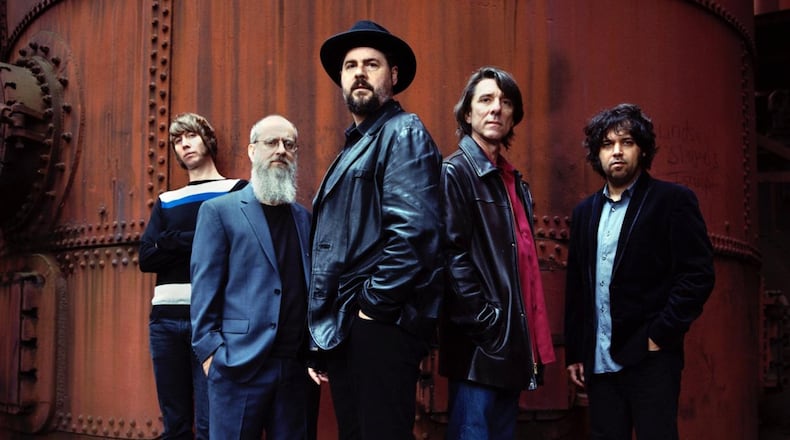It’s about time somebody wrote a book about the Drive-By Truckers, and what a book it is. Stephen Deusner’s “Where the Devil Don’t Stay” (University of Texas Press, $27.95) trades the typical “Behind the Music” tropes of the rock band backstory for a literary, thought-provoking analysis of the dynamics behind the band’s artistry and its complicated relationship with the South.
Cofounded by Mike Cooley and Patterson Hood, longtime friends and musical partners from Muscle Shoals, Alabama, the band got its start in Athens in 1996. The lineup changed often in the early years, but the one constant was always Cooley and Hood, who both write, sing and play guitar. Jason Isbell was the band’s third singer-songwriter-guitar player for six years until he parted ways and became a Grammy Award-winning solo artist.
In the beginning, the band was perceived by those who didn’t listen closely as a throwback to ‘70s-era Southern rock, and it wasn’t unusual to see a rebel flag in the audience. The band rocked, no doubt, and they did sing about the South. But their lyrics were about something else altogether.
While still proclaiming pride in aspects of the South, their songs told stories that were critical of the region’s racism and classism. Hood described that combination of pride and shame as “the duality of the Southern thing” on the band’s third studio album, “Southern Rock Opera,” which Deusner says is “one of the best and most consequential rock and roll albums of the 21st century.” Misguided fans soon learned they best not fly a Confederate flag at a Truckers’ show unless they wanted to be called out from the stage.
“They were Southern rebels, but they were rebelling against something within the South,” said Deusner.
Based in Bloomington, Indiana, Deusner grew up in Tennessee and was living in Delaware when he first heard the band in 2003.
“I had just moved away from the South. My dad was very sick at the time and sick in a way that I knew he was not going to get better,” said Deusner. “To be missing home and to be missing family and then to have this band that knew what those things are hit me really hard.”
He pinpoints the song “My Sweet Annette” from the “Decoration Day” album as the song that hooked him.
“This band knew what my home was like but wasn’t sugarcoating it and also wasn’t romanticizing it,” he said. “I think the seeds of this book were sown in that moment.”
“Where the Devil Don’t Stay” is not a chronological telling of the band’s trajectory. Instead, it’s like a travelogue that maps locations around the South where the band lived and worked and based their songs. And it examines how those places shaped the band. It was an idea Deusner latched onto pretty early in the writing process.
“I thought that would get at something that was very unique to the band, that might get at what they’re trying to say about the South,” he said.
Athens figures prominently in the book, naturally. When Hood moved to Georgia in 1994, he was headed to Atlanta with an eye on Cabbagetown and the country punk scene known as the Redneck Underground. But when he visited a friend in Athens, he was swayed to change his plans and eventually convinced Cooley to join him. That environment turned out to be part of the secret sauce that made the band click.
“I think having something that felt manageable, that wasn’t a big city like Atlanta but was a small, more contained, more noble community gave (Patterson) a sense that he could play music on his own terms,” said Deusner. “He could do the things he wanted to do and let things gestate a little bit. I think that place fostered the band and gave them the tools they needed to survive and sustain success over time.”
Credit: Anna Powell Denton
Credit: Anna Powell Denton
Now in its 25th year, the band continues to evolve. Hood has become a displaced Southerner, having moved to Portland, Oregon, in 2015. The following year, the band released “American Band,” what Deusner calls a “career-revitalizing album” and “one of the great rock protest albums of the last decade.” It marked a departure from the band’s previous studio albums in several ways, starting with the cover, which featured a black-and-white photograph of an American flag at half-mast instead of the usual trippy illustration by Wes Freed.
The album alienated a lot of fans who thought it was too political, said Deusner, but as he points out, the band has always been political.
“They were very political depicting the South, depicting urban-rural divides, depicting these locales that had been scenes of racism and violence ... but it’s just filtered through story and character,” said Deusner. “It’s not them speaking to you directly, it’s them telling you stories that address those issues. Whereas, in ‘American Band,’ they remove that wall, and they’re speaking more directly and they’re speaking very specifically and with a lot of outrage.”
By calling the record “American Band,” Deusner said the Drive-By Truckers are sending a signal that they are widening their scope.
“They’ve always talked about the duality of the Southern thing,” said Deusner. “The phrase that came back to me when I heard that album was that it was now the duality of the American thing.”
Suzanne Van Atten is a book critic and contributing editor for The Atlanta Journal-Constitution. Contact her at svanatten@ajc.com and follow her on Twitter at @svanatten.
About the Author
The Latest
Featured




